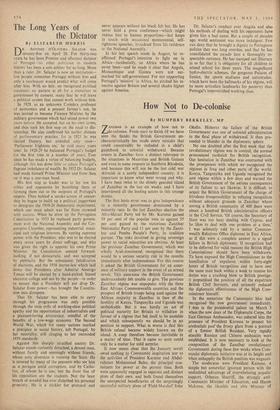The Long Years of the Dictator
By ELIZABETH MORRIS
DR. ANTONIO D'OLIVEIRA SALAZAR was seventy-five on April 28. For thirty-two years he has been Premier and effectual dictator of Portugal--no other politician in modern history has been a sole arbiter for so long. More than a ruler. Dr. Salazar is now an institution— few people remember Portugal without him and only a soothsayer would predict what will come after him. With no heir. no recognised political successor, no pattern at all for a transition to government by consent, many fear he will leave a political system that cannot work without him.
In 1928, as an unknown Coimbra professor of economics and a peasant farmer's son, he was invited to become Finance Minister by the military government which had seized power two years before. He accepted, but on his own terms, and thus took his first step on the road to dic- tatorship. He also confirmed his earlier distaste of parliamentary practice, for in 1921 he was elected Deputy, but attended only once— 'Parliament frightens me,' he said many years later. In 1928-29 he balanced Portugal's budget for the first time in a number of years. Ever since he has made a virtue of balancing budgets, although this has done little to adjust Portugal's flagrant imbalance of wealth. By 1932 Dr. Salazar had made himself Prime Minister and from then on it was a one-man band.
His first step as leader was to lay low his critics and opponents by banishing them or farming them out to the outposts of Portugal's empire. Then behind a smoke-screen of censor- ship he began to build up a political juggernaut to denigrate the 1910-26 democratic experiment, which one must admit was far from crowned with success. When he drew up the Portuguese Constitution in 1933 he replaced party govern- ment with the National Assembly and the Cor- porative Chamber, representing industrial, muni- cipal and religious interests. By vesting supreme power with the President. who was to be elected every seven years by direct suffrage, and who was given the right to appoint his own Prime Minister, the Constitution seemed forward- looking. if not democratic, and was accepted by plebiscite. But the subsequent falsification of elections, and the 1958 decree-law which laid down that Presidents after Admiral Amerigo Tomas will be elected by a hand-picked, biased electoral college and not by the people—in order to ensure that a President will not drop Dr. Salazar from power—has brought the Constitu- tion into disrepute.
That Dr. Salazar has been able to carry through his programme was only possible through the twin evils of working-class political apathy and the opportunism of industrialists and a pleasure-loving aristocracy, mindful of the benefits of a low-wage economy. The Second World War, which for many nations marked a precipice in social history, left Portugal, by her neutrality, still clinging to her outmoded 1939 standards.
Against this sharply stratified society Dr. Salazar stands curiously detached, a devout man, without family and seemingly without friends, whose only diversion is running the State. He is revered by many of the peasants who see him as a paragon amid corruption, and by Catho- lics, of whom he is one, but the front line of his opposition are the students. Not the least breath of scandal has ever disturbed his personal propriety. He is a stickler for protocol and Dr. Salazar's conduct over Angola and also his methods of dealing with his opponents have given him a bad name. But a couple of decades ago world sentiment was more indulgent. Few can deny that he brought a dignity to Portuguese politics that was long overdue, and that he has consolidated the escudo into a thoroughly re- spectable currency. He has stamped out illiteracy in so far that it is obligatory for all children to attend school for three years. The magnificent hydro-electric schemes, the gorgeous Palaces of Justice, the sports stadiums and autostradas, which have been the hallmarks of his regime, will be more articulate landmarks for posterity than Portugal's impoverished working class. never appears without his black felt hat. He has never held a press conference—which might reduce him to human proportions—but keeps in touch with occasional monumental, self- righteous speeches, broadcast from his residence o: the National Assembly.
In his last speech made in August, he re- affirmed Portugal's intention to fight on in Africa—incidentally, an Africa where he has never been—and he made it clear that Angola, Mozambique and Guinea were not ear- marked for self-government. For not supporting Portugal's 'mission' in Africa, he pitched his in- vective against Britain and several shades higher against America.














































 Previous page
Previous page